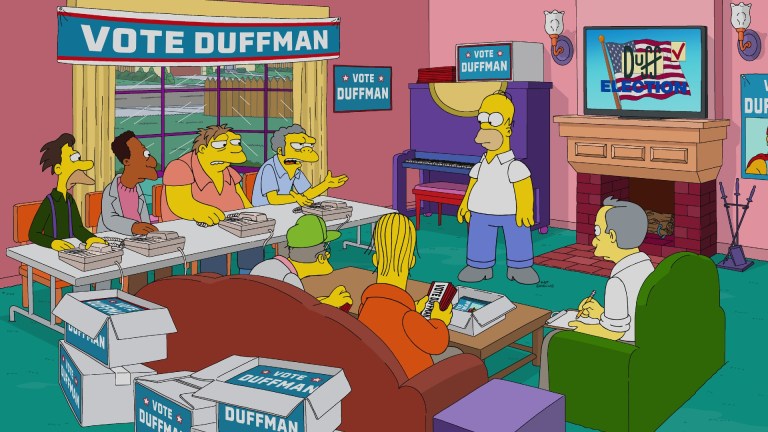The Simpsons Combines K-Pop, Beer, and Democracy
Duffman solves a problem without alcohol in The Simpsons’ “From Beer to Paternity.”

This The Simpsons review contains spoilers.
The Simpsons Season 34 Episode 7
Homer Simpson isn’t the best dad on TV. He has a passing resemblance to the most representational, and he’s learning. The Simpsons gives him the chance to pass on his accumulated wisdom in “From Beer to Paternity,” but it gets there anyway.
The basic story is about Duffman, who is losing an election to retain his title as Duff Beer’s sudsiest representative, while trying to win back his estranged daughter, Amber. Fanboy Homer goes along for the ride, but Lisa is actually navigating. The waters are surprisingly treacherous, and nowhere near as refreshing as beer. Episodes focusing on the relationship between Lisa and Homer consistently provide wide arcs, presenting some of bona fide classics. “From Beer to Paternity” has heart and a journey Duffman can respect.
Bringing a secondary character into the father-daughter mix helps with perspective, and falls into the Simpsons tradition where Homer is found lacking by almost any comparison. Duffman is an interesting correlation. He obviously is a worse father than Homer, already established as a low bar, and fumbling through cancel culture as clumsily as the drunks who are his people. The problem of the soon-to-be-formerly successful mascot is that “with great pilsner comes great infidelity,” which he always took as part of the job, and the entitlement of boozy celebrity. It’s not his fault, the episode opens with a Duff Commercial from the 1950s which is downright demeaning in its assessment of housewives’ abilities, and the company’s image has always been to party on. But as the Duff marketing executive says, “those days may have been the days back then but these days aren’t those days anymore.” These days the party’s off.
Duffman is under serious competition in the mascot contest, including a Woketopus who pushes every button on diversity appeal, and Helen Mirren, clueless to she’s endorsing and still a favorite to win. The segment where Duffman tries to shore up support is a mixed bag of obvious reveals, such as dousing the women’s legal diversity initiative meeting, and subtle visual gags, like getting Ruth Bader Ginsburg’s book thrown at him.
The support group of fathers-of-estranged-daughters, including Kent Brockman, Rainier Wolfcastle, Superintendent Chalmers, and Mr. Hibbert, make a few very good points, and move on thankfully fast. The most cautionary tale comes from Krusty, who explains why a self-published rebuttal book is a clownish legal strategy. The calls to “ignore us,” however, prove recycled gags still produce energy. Chick magnets aren’t just prop comic toys in this episode, except when they are. There is just enough foreshadowing that the audience knows what is coming before we get pulled in, and it still provides a quick giggle, if you don’t think about it too long.
There are a lot of individually hysterical lines in the midst of the bonding. The Agatha Christie Museum has a special celebration of the mystery writer’s top red herrings. But sorry Charlie, a tuna mascot selling canned seafood does come across a little cannibalistic. Homer’s backwards logic is in rare form tonight, from his disappointment in Marge for not sleeping with Duffman, to telling Lisa to wash her mouth out with beer. Homer’s great reveal isn’t that he had his first beer at 13, but he will have his last at 54. It is a glimpse into almost all his motivations.
The discussion Homer and Lisa have in the car, using their hope for Duffman and Amber’s reconciliation as a stand-in for their own problems, is a tidy fix with anger and disappointment mixed with emotional resonance and vulnerability. Even if Homer did, initially, prefer making the road trip with Lisa Bonet. The sequence shortcuts all the beats without missing any of the feel. The common ground comes organically as their clipped deliveries soften into reconciliation. It is a shame Duffman doesn’t drop into his real voice more often, it would have given his character a chance to deepen his subplot.
Duffman learns many lessons in “From Beer to Paternity.” The most obvious being how Kombucha is now classified as an adult beverage, which he can never hawk. He also learns not all Duffocrats are doves, some tote guns to mascot conventions. He is brutally reminded he can no longer compete with the Mucinex Loogie. And while his biggest takeaway from the “all chicks are somebody’s daughter” revelation is that some chicks are guys, he does come to terms with the times.
The highlight of the episode is hearing Homer, Duffman, and Lisa sing, in Korean, along to Blackpink’s “Lovesick Girls” on the road trip. It’s no wonder Kim Jong-un would plan to kidnap the American TikTok sensation with the handy beer-hose belt. For all the rules of parenting learned on the road, Duffman finds the perfect father figure in Puff Daddy.
“From Beer to Eternity” is an effective character expanding episode, which mixes the rush of a popularity downfall with the sadness of the climb to the top. It suffers from a lack of Bart, who only brings one line of abrasive counterpoint. Marge’s commentary is concise, perceptive, and cutting. But the only truly new wrinkle in the father-daughter dynamic is the “prop daughter” and how it is mirrored by the two fathers. The Simpsons consistently finds the easiest place to land, but leaves enough bruises so make them think twice about doing it again. At least until the next time.
